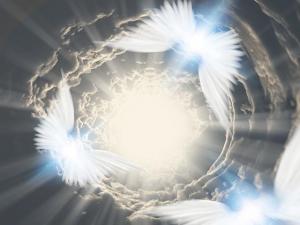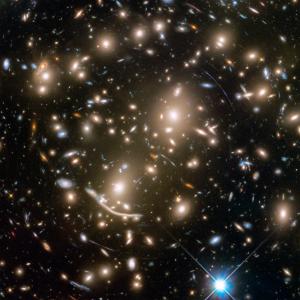
Scientists are hard at work investigating the question, Is there life on other planets. They are finding Earth-like planets and listening for radio signals from possible alien civilizations. Imagine the excitement if another intelligent “life form” is discovered, although travel and even communication back and forth will be completely impractical. I suspect part of the excitement is due to the fact that we feel otherwise so misplaced in the cosmos.
In the present scientific picture of the world, it’s practically dogma that there’s nothing like human meaning in the non-human world. Nothing is given to us; we make meaning for ourselves. If we do find alien life and civilization, we’ll still be quite alone down here. Some years ago I found an opinion column that put the point eloquently:
As the romance of manned space exploration has waned, the drive today is to find our living, thinking counterparts in the universe. For all the excitement, however, the search betrays a profound melancholy — a lonely species in a merciless universe anxiously awaits an answering voice amid utter silence. (Charles Krauthammer in The Washington Post, 12/30/11)
Are we on our own or could there still be a kind of support for things that we value most, for morality and beauty and the sense we have that our lives have meaning and purpose? Does the material world, apart from the specifically human context, have its own angels and potential demons?
Truth, goodness, beauty – the transcendental properties of being
In several posts I have been following Walter Wink’s interpretation of angels. They are the powers described in the New Testament as thrones, principalities, authorities, etc. Visible products of human activity, they also have a spiritual side or, as Wink calls it, a “within.” They are institutions customs, communities, all the things that make it possible for us to be who we are. They are created good, but they can become demonic.
Wink’s emphasis on these human creations (which make us as much as we make them) seems to be too limiting. He hints about angels of the non-human world but doesn’t get much beyond hints. In this post I want to expand on those hints. I want to affirm that angels exist independently of human activity, not in a world of their own but as powers of the cosmos. There is meaning in the cosmos other than what humans make.
I’m looking to what the philosophers of the Middle Ages called the transcendental properties of being. Transcendental properties are properties that everything has just because it is. These properties stretch across, transcend, all categories. Among these properties are truth, goodness, and beauty. I think they could also be names of angels, making a cosmos instead of a cold, indifferent universe, giving a kind of support to the world of human meaning.
Support for science from the Angel of Truth.
It’s an axiom in science that nature does not care about us. Of particular concern to scientists, she does not just give us her secrets. To find out anything dependable about reality, beyond mere appearance, you have to work at it. We use the scientific method: ask a question, make a hypothesis, predict what new phenomena should be observed, devise an experiment. We reject the hypothesis if the new phenomena don’t appear or accept it, subject to further testing if they do. In this process meaning does not go from the world to our minds. It starts out as an idea, a guess, in our minds.
The universe has no natural propensity to reveal itself any more than bricks naturally seek to go down or fire to go up. It’s all the more remarkable, then, that we can understand the universe at all. The structures of our minds, especially logic and mathematics, are amazingly suited for application to reality. Reality never contradicts itself but follows the laws of our logic. When we finally understand scientifically what reality does, there’s a mathematical equation that expresses it. The universe doesn’t give itself to our knowledge, but its structures are fundamentally intelligible. The universe supports the human activity of knowing.
Support for morality from the Angel of Goodness
Teilhard de Chardin imagines a paradoxical kind of support we get from the matter of the universe in his hymn quoted in a previous essay. He addresses matter:
You who batter us and then dress our wounds, you who resist us and yield to us, you who wreck and build, you who shackle and liberate…. Without you, without your uprootings of us, we should remain all our lives inert, stagnant, puerile…..
Imagine a world without the stubborn resistance that matter, whether of our bodies or anything else, offers—a world in which anything is possible. Nothing a person does could make any difference. Anything I do, whether good or bad, you could undo, and vice versa. My future doesn’t depend even on my own past. I can undo or ignore what I did yesterday and do something completely different today.
There is no “supposed to” in nature, but the material world, with its boundaries, throws us together into a situation where actions have consequences. Science doesn’t work miracles. It can’t fix every environmental problem that our behaviors cause. Matter remembers, a memory that connects present with past and future. Matter connects actions with consequences, and—most blessedly—one person with another and people with a world. Moral situations arise because of matter.
This is not an easy partner to live with, but partner it is; and only because we live with such a partner can our actions have any meaning. Without matter, without the limitations that matter imposes on us, everyone would be isolated in his or her own world. I think if people thought this through they would take seriously the fact that we live with limits and even rejoice in that fact.
Support for aesthetic sensitivity from the Angel of Beauty
I’ve always thought that the saying “Beauty is in the eye of the beholder” is backwards. If anything, ugly is in the eye of the beholder; beauty is what’s really there.
To be beautiful a thing has to have a definite form. Infinity is not beautiful, and the universe that science is revealing to us in not infinite. Not infinite in size, mass, energy or whatever other quality there might be.
Finitude connects the Angel of Beauty to the other two angels. An infinite world is not intelligible. Scientists sometimes end up with infinities in their equations. This immediately tells them that something is wrong. A scientific theory is supposed to be beautiful (in a sense that probably only a scientist can appreciate). A moral world, too, is a world with limits. Within those limits a story is possible—movement with beginning, middle and end (not like a soap opera). A good story is not only good; it’s also beautiful, and true in its way.
All three of these angels, and perhaps more, are real features of our world. There is truth even if nobody knows it. There is good even if everybody violates it. Beauty exists even if no two people can agree on it.
Angels and demons
These angels of the non-human world can become demonic like the angels of human institutions seen in previous posts. It happens in the same way as before–through idolatry. We put the wrong one first for the situation we are in. For example, a scientist so bent on some moral quest that he cannot be objective makes an idol of the Angel of Morality. That demon then ruins the science without actually serving morality. The same thing can happen in the artistic world. Many a bad story has come from trying to inculcate some moral ideal instead of simply telling a good story. A good story communicates a moral without trying to, but a moralistic tale turns people away. Unless it’s on TV. Then parents have their children watch it.
On the other hand, when the context is the moral field of action, including politics, then the other two angels can turn into demons. How much money should we spend on sending people to Mars? How far should we go in experimenting on animals, or people? Are there some technologies that we should not pursue or should not have pursued—nuclear weapons, performance enhancing drugs? What limits should we observe in areas like genetic manipulation? If we ignore these moral questions we turn science’s angel into a demon.
Other moral questions face the world of literature and art. What counts as art and what limits should not be crossed here? Courts may not be able to define pornography or spell out when there has been an improper assault on cultural or religious sensibilities; but the moral issue remains. Artists who assume they have absolutely free reign because “it’s art” are calling up another demon.
The Goddess Fortuna
These powers do not have us in mind. That far I will go with the scientific view of an indifferent universe. The powers just are, and we embody what they are—in their true natures or in the demons that we make of them. Because the angels don’t act toward us but just are, our relation to them—embodying—preserves our identity. We are not the playthings of the gods.
The name Fortuna, or Lady Luck, is a symbol for the fact, that the universe does not exist to serve us or to confound us. It does both, but without a plan in advance. When the benefit we accrue or the pain we endure is out of proportion to the effort we put in, that’s the luck of the draw, or somebody’s cheating.
Science refuses to accept luck as an explanation for anything. That would be just as unscientific as saying, “God did it.” But science does place chance in a prominent position. Chance variation explains the origin and variety of life on earth. But that’s not a lucky chance. It’s the predictable result of innumerable tries. Likewise the fact that we live in a universe fine-tuned for life is the predictable consequence of the huge number of universes that are supposed to exist—if the Multiverse Theory is correct.
Idolatry again
It’s possible to worship the Goddess Fortuna especially for people who are satisfied with the lot this god has dealt them. Lady Luck deals unequal hands. The science of statistics categorizes this inequality: a large middle area where most of us reside, the rest distributed in one or more standard deviations up or down from there. On a graph it’s a bell-shaped curve.
I read an article some time ago about a computer simulation on economics. It begins with a wealth distribution according to the normal bell-shaped pattern. A few people are rich, a very few are very rich, and likewise for the poor and very poor. The largest part of the bell curve encompasses the somewhat comfortable people in the middle. The program controls for everything else. Factors like intelligence, social background, personality, etc. are the same across the board.
After a relatively short playing time the wealth starts moving toward those who are already at the top. In other words, the rich get richer, and the very rich get very much richer. The rest get further and further behind.
I didn’t save the article or I could be clearer about how it works. The conclusion, though, is that, even if we didn’t have well-funded special interest groups, bought and sold legislation, and everything else that now favors people who are already rich—even if it were just chance and not systemic injustice that determines how wealth travels—we would still see at least some of what is so dramatically in evidence today. Wealth shifts naturally toward those who are already rich and away from the poor and middle class. Unless, that is, we work to prevent it, unless we have in our laws and institutions, something like what biblical religion calls “a preferential option for the poor.”
Invisible hand or preferential option
The article I mentioned concludes that rich people can easily salve their consciences about escalating inequality if they can just say, “It’s nobody’s fault that some people are poor, certainly not mine. It’s just the roll of the dice.” And who can argue with Goddess Fortuna or with the bell-shaped curve that decrees there will always be poor people. Preferential option for the poor, plain social justice straight out of the Bible, is blasphemy for those who worship Fortuna. These include followers of Ayn Rand, increasingly vocal and influential libertarians, and anyone who believes in the “invisible hand” of the market.
Idolatry and true religion both have all sorts of political implications. Leslie Newbegin, who follows Walter Wink on the “principalities and powers” says:
This…invisible power ruling over human affairs…is one of the key arguments of the religious right…that one cannot speak of justice or injustice when describing the huge differences between rich and poor in our society. These…are not the work of conscious human agency but the result of chance. Thus in our economic life we are no longer responsible…for economic life has been handed over to the goddess Fortuna. It is not hard to recognize that as one of the principalities and powers of which Paul speaks. (The Gospel in a Pluralist Society, pages 206-07)
One sure sign of the devil at work is good people doing evil things. Now we have another sure sign: good people declining to do good things, opting out of the struggle for justice.












